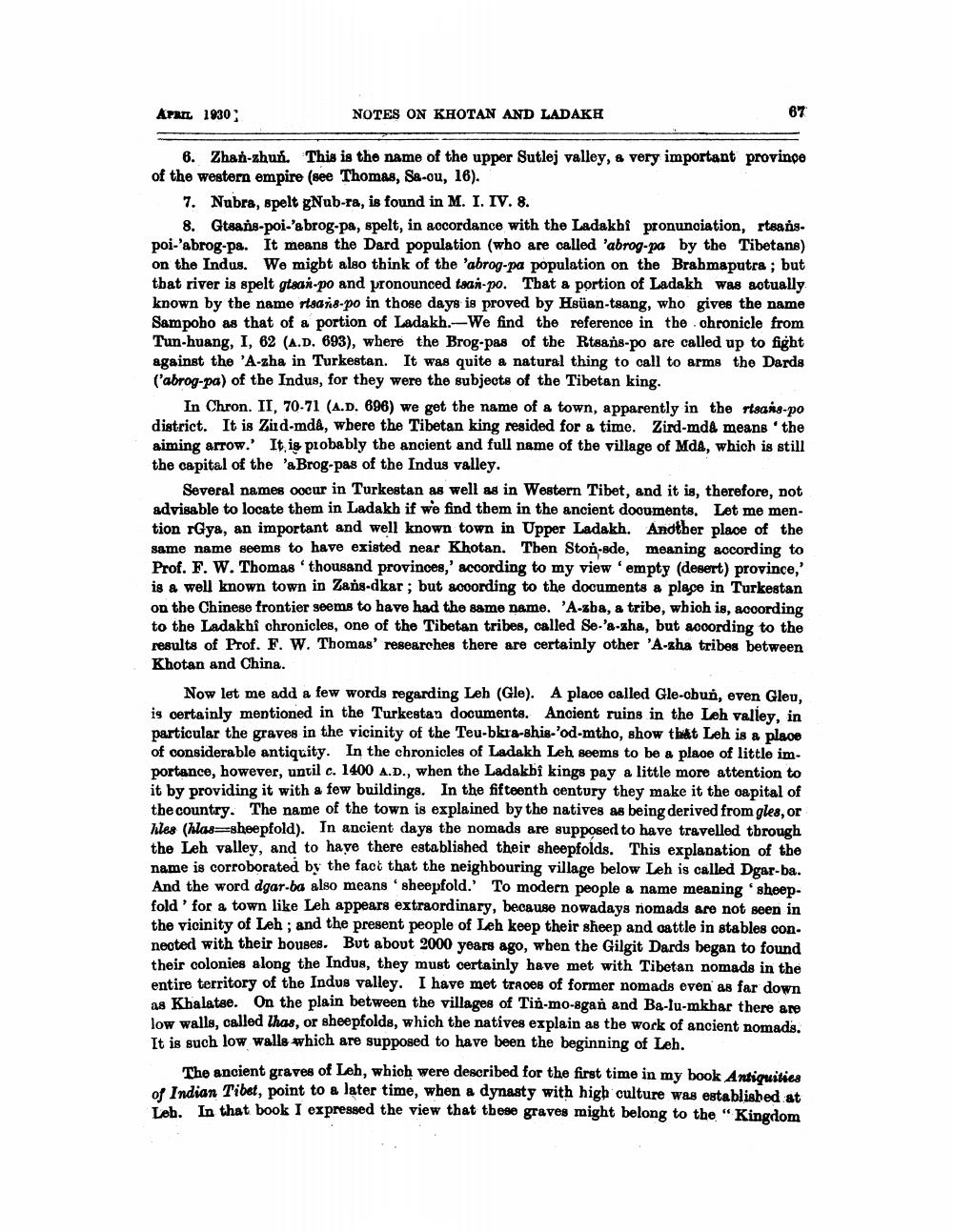________________
APRIL 1930
NOTES ON KHOTAN AND LADAKA
67
6. Zhan-zhun. This is the name of the upper Sutlej valley, & very important province of the western empire (see Thomas, Sa-ou, 16).
7. Nubra, spelt gNub-ra, is found in M. I. IV. 8.
8. Gtsans-poi-'abrog-pa, spelt, in accordance with the Ladakhi pronunciation, rtsanspoi-'abrog-pa. It means the Dard population (who are called 'abrog-pa by the Tibetans) on the Indus. We might also think of the 'abrog-pa population on the Brahmaputra ; but that river is spelt glean.po and pronounced tear-po. That a portion of Ladakh was aotually known by the name risanis-po in those days is proved by Hsüan-tsang, who gives the name Sam pobo as that of a portion of Ladakh.-We find the reference in the chronicle from Tun-huang, I, 62 (A.D. 693), where the Brog-pas of the Rtaans-po are called up to fight against the 'A-zha in Turkestan. It was quite a natural thing to call to arms the Dards ('abrog-pa) of the Indus, for they were the subjects of the Tibetan king.
In Chron. II. 70-71 (A.D. 696) we get the name of a town, apparently in the rischs-po district. It is Zind-mda, where the Tibetan king resided for a time. Zird-mdd means the aiming arrow.' It is probably the ancient and full name of the village of MDA, which is still the capital of the 'a Brog-pas of the Indus valley.
Several names oocur in Turkestan as well as in Western Tibet, and it is, therefore, pot advisable to locate them in Ladakh if we find them in the ancient documents. Let me mention rGya, an important and well known town in Upper Ladakh. Andther place of the same name seems to have existed near Khotan. Then Ston-ade, meaning socording to Prof. F. W. Thomas 'thousand provinces,' according to my view 'empty (desert) province,' is a well known town in Zans-dkar; but according to the documents a place in Turkestan on the Chinese frontier seems to have had the same name. 'A-sba, a tribe, which is, according to the Ladakhi chronicles, one of the Tibetan tribes, called Se.'a-xha, but according to the results of Prof. F. W. Thomas' researches there are certainly other 'A-sha tribes between Khotan and China.
Now let me add a few words regarding Leh (Gle). A place called Gle-obun, even Gleu, is certainly mentioned in the Turkestan documents. Ancient ruins in the Leh valley, in particular the graves in the vicinity of the Teu-bkra-shis-'od-mtho, show that Leh is a place of considerable antiquity. In the chronicles of Ladakh Leh seems to be a place of little importance, however, until c. 1400 A.D., when the Ladakbi kings pay a little more attention to it by providing it with a few buildings. In the fifteenth century they make it the oapital of the country. The name of the town is explained by the natives as being derived from gles, or hles (hlas=sheepfold). In ancient days the nomads are supposed to have travelled through the Leh valley, and to have there established their sheepfolds. This explanation of the name is corroborated by the fact that the neighbouring village below Leh is called Dgar-ba. And the word dgar.ba also means sheepfold.' To modern people a name meaning sheepfold' for a town like Leh appears extraordinary, because nowadays nomads are not seen in the vicinity of Leh; and the present people of Leh keep their sheep and oattle in stables con. nected with their houses. But about 2000 years ago, when the Gilgit Dards began to found their colonies along the Indus, they must certainly have met with Tibetan nomads in the entire territory of the Indus valley. I have met traces of former nomads even as far down a Khalatee. On the plain between the villages of Tin-mo-agan and Ba-lu-mkbar there are low walls, called thas, or sheepfolds, which the natives explain as the work of ancient nomads. It is such low walls which are supposed to have been the beginning of Leh.
The ancient graves of Leh, which were described for the first time in my book Antiquities of Indian Tibet, point to a later time, when a dynasty with high culture was established at Teb. In that book I expressed the view that these graves might belong to the Kingdom




